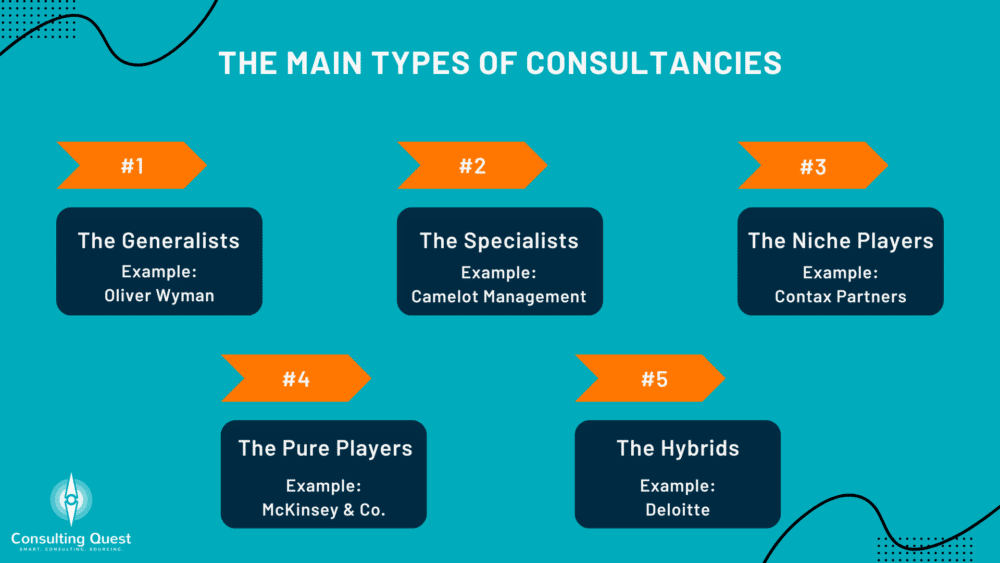
A Guide to The Types of Consultancies – Which One Do You Need?
Consultants, consultants, consultants. They’re like Pokemon – there’s just so many of them out there! And just like Pokemon, there are different types based on their capabilities. But wait, there’s more!
There are other ways to distinguish these mystical creatures. It’s like sorting them into Hogwarts houses, except instead of Gryffindors and Slytherins, we have HR consultants and finance consultants and a lot more.
At the end of the day, it all comes down to what each consultant excels at. Maybe some specialize in a specific industry, or perhaps they have a superpower that makes them the go-to for a particular type of project.
Moreover, there are several other factors that can be used to differentiate consultants and the services they provide. Because capabilities are the primary differentiator for consultancy types, let’s start with the basics and then move on to specialization and a few other factors.
What Does the Term ‘Consultancy’ Mean?
The word “consult” comes from the Latin word “Consultare,” which means “to ask someone for advice.” In Ancient Greece, this word was made up by the priests of the Oracles of Delphi. At the time, these priests were the society’s most trusted advisors because they knew how to solve a wide range of tricky problems.
Over time, consulting firms have become synonymous with the word “consultancy,” especially in British English. “Consulting” is a modern word for a service that helps you find a solution to a problem that requires expert knowledge in a certain field. A consultant is an expert who knows a lot about the process or topic you are interested in.
How Are the Types of Consultancies Categorized?
Capabilities are the things that consultants do for their clients. Often, they show the business functions that client companies should do best in order to make money. This part is very important when talking about consulting work. Most corporate presentations from consulting firms will have at least this information.
The consulting capabilities are divided into seven high-level categories, like a process map. The size of the market for such capabilities is based on the different sizes and budgets of the connected client services and the value that can be made from them.
What is Specialization in Consultancies?
As we all know, the consulting industry started out with a focus on making businesses more efficient. After that, there was a time when strategy work grew. The main thing that drove it was the capability dimension, while the industry played a supporting role.
A number of consulting experts, such as Bill Bain and Dominique Mars, have said that consulting firms should only work with one client per industry to avoid conflicts of interest.
On the other hand, companies are becoming more and more specialized. And for many clients, industry expertise is becoming a requirement. For many businesses, it is also a way to make more money and get more work done.
The Types of Consultancies
There are several types of consultancies such as the generalists, the specialists, the niche players, pure players, and the hybrids. Let’s briefly describe each of these, one by one.
The Generalists
Generalist consulting firms offer a lot of different services. Most of the time, they cover most of the industry-capabilities matrix. For example, Oliver Wyman is a generalist consulting firm that works with clients from almost every industry on things like strategy, sales and marketing, operations, organization, and finances.
The Specialists
Specialist consultancies focus on one area of consulting and do it very well. They put all of their efforts and skills into a single skill or industry. For example, Camelot Management Consultants is a specialized consulting firm that only works with four industries: chemicals, life sciences, consumer packaged goods, and industrial manufacturing.
The Niche Players
Niche players are consulting firms that work only in a certain field. They are places where a lot of different services and industries meet. For example, Contax Partners is a niche consulting firm that works in the Middle East and Africa. They focus solely on energy strategy.
The Pure Players
Pure players are companies that do nothing else but offer consulting services. Large consulting firms such as McKinsey, the Boston Consulting Group, and Bain & Company are mostly pure players.
The Hybrids
In addition to their primary business, hybrid enterprises offer consultancy services. They could be experts in systems, accounting, law, or auditing. Some well-known hybrid companies include Deloitte, EY, and PwC, who have audit and tax as their primary businesses.
The Other Dimensions in Types of Consultancies
There are several other dimensions to consider in relation to the types of consultancies. Let’s have a look at them now.
Size & Geographic Footprint
Similar to how it is in other industries, a company’s footprint is extremely important. It might make it harder for consulting services to understand local business practices.
The original location of the consulting firm may have an effect on the cost of travel. Think about a crew that commutes for six months from Germany to Singapore.
Size and footprint are typically closely related. In the consulting industry, people matter. As a result, ambitious businesses grow and continue opening offices elsewhere.
Ownership Structure
Like law firms, the bulk of consulting companies are structured as partnerships. A small group of equity partners serve as “rain-makers,” bringing in clients and projects, and they are the foundation of the company.
But as they become older (and are regularly bought), an increasing number of consulting firms go public and are taken over by larger, more established enterprises, or are transformed into consulting divisions by other service firms.
A company’s management is frequently likened to that of a partnership. On the other hand, the pressure on results and revenue expectations is different. This sector includes businesses like Accenture, Oliver Wyman (owned by MMC), FTI Consulting, and Huron Consulting.
Profile of Partners
You can see from the profiles of the partners whether they are a diverse, enterprising, technically proficient, or clone army. Additionally, it will allow you to quickly ascertain whether the consulting company is claiming experience without having any proof of it.
You can now immediately access virtually any consulting partner’s website information thanks to modern technologies. They should have a profile on both LinkedIn and the company website. And if you request a proposal, you will almost certainly have included a third version of their résumé that highlights their relevant experience.
Delivery Model
The main project success indicators are based on how delivery models are viewed. These crucial success factors may be related to hard or soft factors. Utilize advisors that are very sensitive to soft elements to introduce your newly developed plan and garner support.
You could want to recruit professionals who are more focused on the challenging components of this plan in order to create it in a fact-based manner. It can be difficult to find advisors who can help with both aspects.
It is important that your goals and the way consultants normally work together are both compatible. Some consulting firms are more adept at identifying issues or formulating plans of action. The assistance of others will be quite helpful during the execution phase.
So, Which Type of Consultancies Do You Need?
There are numerous types of consultancies, each of which offers beneficial services to companies in numerous industries. When a client lacks the specialized knowledge needed to address a complex business challenge, consultants are recruited.
In order to ascertain their capacities, what benefits might they offer your consulting project? You should consider the firm’s ownership structure, partner profiles, size and geographic footprint, and delivery strategy, among other factors.
Now that you are aware of the many types of consultancies and consultants according to their specializations and corresponding skill sets, you can make more informed decisions. Additionally, you are aware of the partners’ histories and locations around the world.
You start to clearly see “what” they might do for you as a result, or at the very least, “what initiatives” they might add value to. And that’s a requirement to more effectively purchase consulting services.
Closing Thoughts
As you’ve read, consulting is a broad term that can encompass many types and specialties. Depending on your business or project needs and goals, there’s likely to be a few types of consultancies that could help take your operation to the next level.
The main thing is to research your options and figure out what kind of expertise best suits what you’re looking to accomplish. Be sure to go with a firm you trust, who have plenty of experience in the area they specialize in.
With the right consultancy by your side, you can unlock new opportunities and get back to focusing on what it is you do best – running your business like a boss! Moreover, you can join Improveo – a professional networking site and get in access to a plethora of consulting firms, consultants, and lots more, right at your fingertips.
Hélène Laffitte is the CEO of Consulting Quest, a Global Performance-Driven Consulting Platform and author of “Smart Consulting Sourcing”, a step by step guide to getting the best ROI from your consulting. With a blend of experience in Procurement and Consulting, Hélène is passionate about helping Companies create more value through Consulting.






